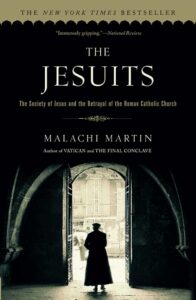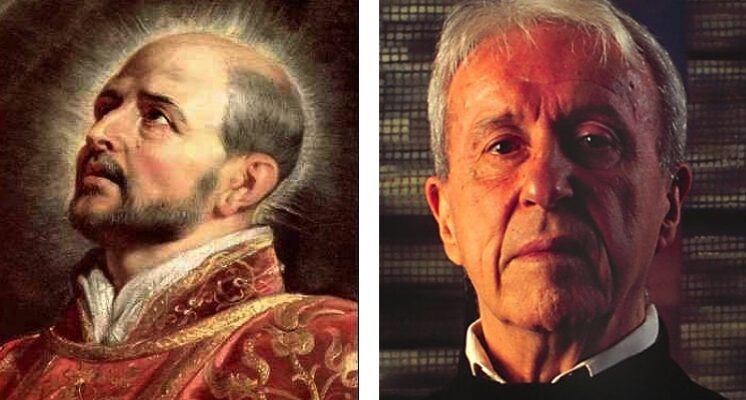Recently I have been finding myself wondering a lot where the cracks came in the Catholic Faith before Vatican II. The Jesuits are generally held as the thermostat—not the thermometer—for the Catholic Church at large (for better or for worse.) So, back when the Jesuits were orthodox, where did the cracks in their faith first appear?
The Jesuits by the late Fr. Malachi Martin SJ answers this. As I read his 1986 production The Jesuits, I discover that his book is a worthy predecessor of Dr. Taylor Marshall’s 2019 book Infiltration. That is, what started happening slowly within the Jesuits a little after 1850 is exactly what Marshall says happened to the Catholic Church at large, also a bit before Vatican II.

Let’s look at some of the reasons which corroded the greatest religious order in the Church. First, there was a sense among a very small minority of Jesuits in the 19th century that science could not be reconciled with religion. Some traditionalists ironically hold this today, and I disagree with them. Of course, I am against evolution as any traditionalist, but some trads today fear that natural sciences are opposed to supernatural sciences. Ironically, this is what the liberal left holds. One need only look at their “science” on the Covid “vax” or transgender surgeries which are mutilating children to see they have absolutely no grasp on science at all. Similarly, in the 19th century, only a very small branch of budding liberal Jesuits thought there was a divide between the two sciences (natural and supernatural.)
Another issue was studying world religions. Although St. Ignatius wanted his Jesuits to know various world religions in order to convert them, certain modern Jesuits studying world religions even before Vatican II fell into the grip of the East. Most of my readers know the disaster of a life lived in the 20th century Jesuit Fr. Pierre Teilhard de Chardin SJ by now. But it seems there were even Jesuits in the 19th century experimenting in Marxism and Eastern Religions:
For, around this time, in view of the rising importance of the “social question,” the growing impact of Marxistic Communism, and the huge leap of the natural sciences, the Society decided to specialize its young men in the new branches of knowledge such as physics, chemistry, paleontology, anthropology, physiology, Assyriology, Oriental religions, Egyptology, sociology, and biology. Insensibly, there started emerging throughout the society a never-vocalized but quite well-knit brotherhood of highly trained academic specialists. They rarely if ever voiced their true feelings and ideas; but they found it increasingly difficult to reconcile the data of their scientific and scholarly training with the traditional doctrines and morality propounded by the Roman Catholic Church and officially defended by the Society. In their work, they consorted with non-Jesuit, non-Catholic scholars engaged in studies similar to theirs, read their results, and developed an understanding for their point of view, which almost without exception was anti-Catholic and theologically Modernist…Two branches of secular science had an especially deep impact on Jesuit theological scholarship: archeological, linguistic, and historical research into the Near East, the cradle of Christianity; and modern researches into anthropology and paleontology.—The Jesuits, p. 219-220
So, it wasn’t eduction that sunk them. It was big-arrogance at a little-education that sunk them. And somehow a slimy minority influenced the whole batch of Jesuits in the end. Pope Pius XII saw this lack of orthodoxy creeping slowly into the Jesuits by the 1940s, and he called them to task for this. Malachi Martin writes:
In contrast to his physical fragility, however, Pope Pius’s address was tough and hard, a sharply worded catechism of what the Jesuits should be and, by direct implication—sometimes, in the address, by explicit statement—what they unfortunately were not, in the Holy Father’s eyes. From the first words of his address in Latin, His Holiness adopted the tone of a father warning his children what they should do, what they should be like; and what they should not do, what they should not be like…Chief among the things Jesuits had to watch over and improve was doctrinal orthodoxy, agreement with the teaching authority of the Church and the Roman Pontiff. The Society in its Superiors, Pius went on, beginning with the General Congregation, would have to labor in order to ensure that Jesuits held and taught correct doctrine and morality. Certainly, two-thirds of the 185 Delegates to this General Congregation would never have thought a reproach could be uttered to the Society now under this heading. Immediately on the heels of orthodoxy, Pius brought up the question of obedience, in which Ignatius wished his sons to excel. The Pontiff wanted a faithful obedience from them; obedience to this Holy See, obedience to their Rules and Constitutions and traditions, obedience to intermediate Superiors.—The Jesuits, 237.
As I often assert, legalism is the heart of modernism. Many Jesuits in the 20th century subsequently lost their love of the Sacred Heart of Jesus and began—like the Pharisees and Scribes—to look for loopholes of legalism in order to get around true orthodoxy. Martin continues:
For most of the Delegates, however, the reaction was denial: Pius was speaking about unreality. Yet, not one Delegate present was unaware that at least in the major Jesuit theological schools, Jesuit professors shaved as close as possible—if not over—Roman rules of orthodoxy. In France and Germany, professors had one set of notes to show the Roman authorities as the substance of their lectures, and another set of notes for actual use in class. There was “double bookkeeping” at work in a wholesale manner. The Delegates understood that on Pius’s lips correctness and orthodoxy of theology and philosophy meant adhesion to Roman norms. But already for many Jesuits, Rome together with its Pope and his Vatican bureaucracy seemed to be anchored in a mentality that no longer existed outside the church at large. Pius had spoken to a hard new fact. There was something alien for Jesuits about Rome and Romanism.—The Jesuits, 240.
And finally, this line might have a lot to do with the fallen Jesuits: “Malachi personally confirmed to me in 1997 that the ‘pope’ who will lead the apostasy in the Church will be a heretic and an antipope.” – Fr. Paul Kramer, May 2016.
